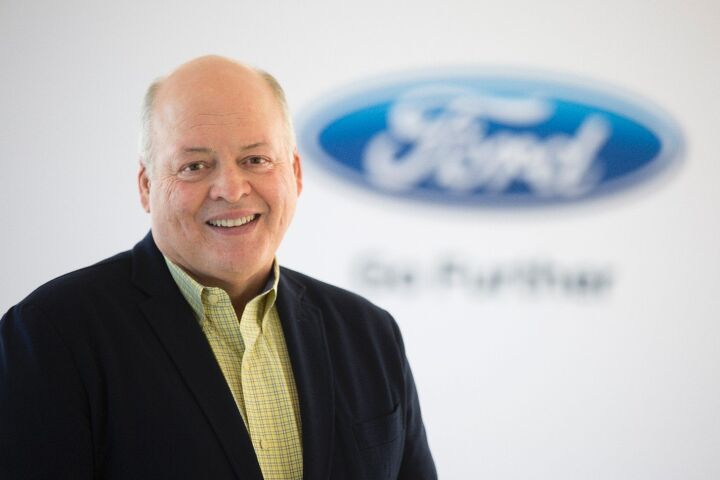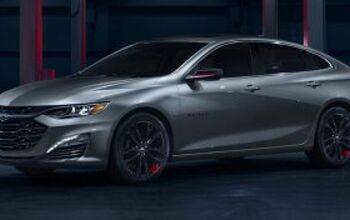Ford's Hackett: 'Dumb Cars' Will Be a Thing of the Past

“Ford’s future is not about giving up the car,” Jim Hackett, Ford chief executive officer, exclaimed at the Michigan CEO Summit in Detroit on Thursday. But he promises there will be “no dumb cars in the future.”
The executive was not assuring attendees that Ford has no plans to revive the Mustang II, rather, he was talking about the brand’s continued efforts to press onward into the development of electric, connected, and self-driving automobiles on a global scale. With Wall Street still fixated on tech, it would be surprising to hear any automotive executive say otherwise.
Ford’s share price had suffered a number of falls since its post-recession rebound and, despite gaining some upward momentum in August, remains south of where top brass would like to be. How much of that is to blame on tech talk is debatable, though. Hackett’s predecessor, Mark Fields, was exceptionally interested in rebranding Ford as a mobility company, but it didn’t make shareholders particularly happy.
Hackett’s strategy appears to be more grounded, without abandoning Fields’ long-term vision of advanced technologies. It’s a balancing act. The current CEO knows Ford’s future will remain that of a traditional automaker, but he’s trying to remind the world that the company is also taking tangible steps into developing “smarter” automobiles.
On Wednesday, Ford announced a joint venture to manufacture and sell a new line of battery-powered cars in China. It has also persisted with connectivity, with Hackett going so far as to suggest linking passenger vehicles to the internet would allow the firm to eventually perform double duty as a data company. While the revenue stream for that isn’t crystal clear, it’s assumed Ford could use the information collected from drivers for targeted advertising purposes. General Motors has proposed something similar in the past via a collaborative venture with IBM.
On the autonomous side of business, Ford has hopped into bed with numerous companies to test self-driving acceptance while testing hardware on the home front. Even though some of these attempts had little to do with vehicle development, you can see the company making headway while the CEO presses for an acceleration of traditional products.
“We have to evolve these things to be ever smarter,” Hackett said, mentioning that connected and autonomous vehicles would provide benefits previously unfathomable from an automobile. “For a while, we didn’t see the computer as an integrated aspect,” he continued. “Now, think about it, my vehicle is a rolling computer.”
[Source: Bloomberg] [Image: Ford Motor Company]

A staunch consumer advocate tracking industry trends and regulation. Before joining TTAC, Matt spent a decade working for marketing and research firms based in NYC. Clients included several of the world’s largest automakers, global tire brands, and aftermarket part suppliers. Dissatisfied with the corporate world and resentful of having to wear suits everyday, he pivoted to writing about cars. Since then, that man has become an ardent supporter of the right-to-repair movement, been interviewed on the auto industry by national radio broadcasts, driven more rental cars than anyone ever should, participated in amateur rallying events, and received the requisite minimum training as sanctioned by the SCCA. Handy with a wrench, Matt grew up surrounded by Detroit auto workers and managed to get a pizza delivery job before he was legally eligible. He later found himself driving box trucks through Manhattan, guaranteeing future sympathy for actual truckers. He continues to conduct research pertaining to the automotive sector as an independent contractor and has since moved back to his native Michigan, closer to where the cars are born. A contrarian, Matt claims to prefer understeer — stating that front and all-wheel drive vehicles cater best to his driving style.
More by Matt Posky
Latest Car Reviews
Read moreLatest Product Reviews
Read moreRecent Comments
- Jor65756038 As owner of an Opel Ampera/Chevrolet Volt and a 1979 Chevy Malibu, I will certainly not buy trash like the Bolt or any SUV or crossover. If GM doesn´t offer a sedan, then I will buy german, sweedish, italian, asian, Tesla or whoever offers me a sedan. Not everybody like SUV´s or crossovers or is willing to buy one no matter what.
- Bd2 While Hyundai has enough models that offer a hybrid variant, problem has been inadequate supply, so this should help address that.In particular, US production of PHEVs will make them eligible for the tax credit.
- Zipper69 "At least Lincoln finally learned to do a better job of not appearing to have raided the Ford parts bin"But they differentiate by being bland and unadventurous and lacking a clear brand image.
- Zipper69 "The worry is that vehicles could collect and share Americans' data with the Chinese government"Presumably, via your cellphone connection? Does the average Joe in the gig economy really have "data" that will change the balance of power?
- Zipper69 Honda seem to have a comprehensive range of sedans that sell well.


































Comments
Join the conversation
Despite all the slamming on Tesla (some deserved, some not)... The one thing I love about them is the constant updating and improving of the infotainment systems. Being stuck with a shitty old Toyota interface unless I buy a new model and get a slightly improved version of the exact same piece of crap interface sucks.
Computers seem to go ka-blooey in catastrophic and permanent ways, often without a whole lot of advance warning. If I wanted those characteristics in my car, I’d still be driving a 1981 Plymouth Horizon. How about working on making some safe, reliable, fun, affordable, stylish “dumb” cars instead of pretending to be a “mobility company”?